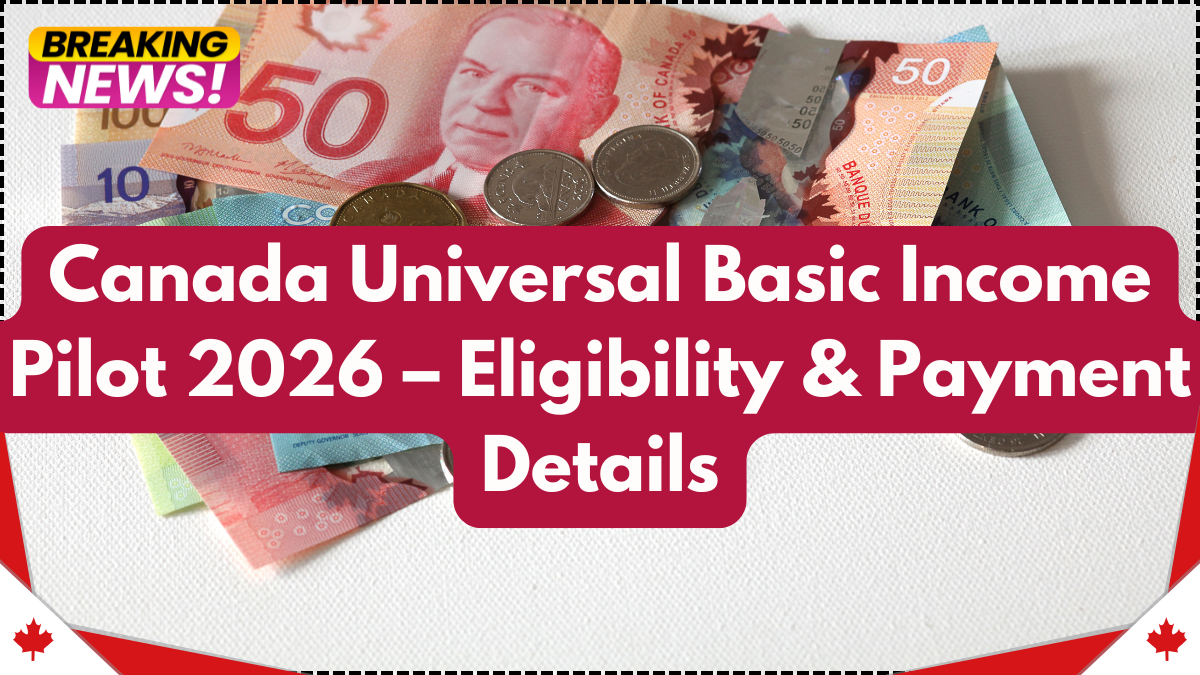Canada is preparing to launch a bold social experiment in 2026: the Canada Universal Basic Income Pilot 2026. This initiative aims to provide a fixed monthly payment to selected citizens to assess how guaranteed income affects financial stability, employment behavior, and overall well-being. Unlike previous short-term programs, this basic income trial will be broader in scope and longer in duration, offering an updated blueprint for future government support policies.

Table of Contents
Key Details: Who Is Eligible for the UBI Canada 2026 Pilot?
Eligibility for the Canada Universal Basic Income Pilot 2026 will be based on a combination of income levels, geographic areas, and demographic representation. The pilot is expected to focus on:
- Low to middle-income households
- Individuals aged 18 and above
- Residents of selected provinces (early reports suggest Ontario and British Columbia are likely candidates)
- Canadians not currently receiving equivalent government benefits
There will also be an emphasis on including participants from diverse backgrounds, including Indigenous communities, newcomers, and individuals with disabilities. Final eligibility rules are expected to be published in early 2026 following legislative approval.
Payment Structure and Duration of the Basic Income Trial
One of the most anticipated aspects of the UBI Canada 2026 program is the payment model. Monthly payments will range between CAD $1,200 and $1,800, depending on household size and current income. Payments will be tax-free and delivered directly to participants’ bank accounts.
The pilot will run for 24 months, with an optional extension based on outcomes and political consensus. Recipients will not be required to stop working; in fact, the trial aims to observe how access to a basic income influences work choices, entrepreneurship, education, and health decisions.
Here is a summary table of expected payment details:
Household Type |
Monthly UBI Amount |
Taxable? |
Conditions |
|---|---|---|---|
Single Adult |
CAD $1,200 |
No |
Income under $30,000/year |
Couple |
CAD $2,000 |
No |
Joint income under $50,000/year |
Family with Children |
CAD $1,800 – $2,400 |
No |
Varies by child/dependent status |
Why Is the Government Launching This Basic Income Trial Now?
The Canadian government is using this trial to address economic inequality, rising automation, and the growing gig economy. With living costs soaring across urban and rural communities alike, UBI Canada 2026 is seen as a possible remedy for economic insecurity.
Supporters argue that a basic income can reduce the reliance on multiple government programs, streamline administrative overhead, and provide dignity to recipients. Critics, however, raise concerns about long-term affordability and potential disincentives to work. The pilot will collect concrete data to support or challenge these positions.
What Makes the 2026 UBI Pilot Different From Previous Efforts?
Unlike earlier efforts like Ontario’s 2017 basic income trial, which was abruptly cut short, the Canada Universal Basic Income Pilot 2026 has bipartisan backing and broader objectives. This time, the approach is national in intent, even if the pilot is regionally focused.
Another major difference is the transparency and data integration planned. Participants will voluntarily allow access to financial, health, and employment records to provide a 360-degree view of the program’s effects. If successful, this could pave the way for a permanent basic income structure across Canada.
Conclusion: A Crucial Step Toward Economic Reform
The Canada Universal Basic Income Pilot 2026 marks a critical turning point in the conversation about income security in Canada. With a structured rollout, clear eligibility, and robust data collection, this trial is more than a test—it’s a possible model for future government support. Canadians watching this initiative unfold will gain valuable insights into what the future of welfare and income redistribution might look like.
FAQs About the Canada Universal Basic Income Pilot 2026
Who will receive the payments in the Canada UBI 2026 trial?
Eligible adults residing in selected pilot provinces with income below a defined threshold will receive monthly payments.
Will UBI payments affect other benefits?
The UBI Canada 2026 payments are designed to complement, not replace, existing federal or provincial benefits. However, overlap rules will apply.
Can participants work while receiving UBI?
Yes. The pilot is structured to observe the effects of basic income on employment behavior. Participants can continue to work without losing their payments.
How long will the basic income trial last?
The pilot is planned for 24 months, with the possibility of an extension based on interim evaluations and policy reviews.
Is this a permanent government policy?
No. The Canada Universal Basic Income Pilot 2026 is a trial project. Its long-term adoption will depend on the results and political decisions following its conclusion.
Click here to learn more





